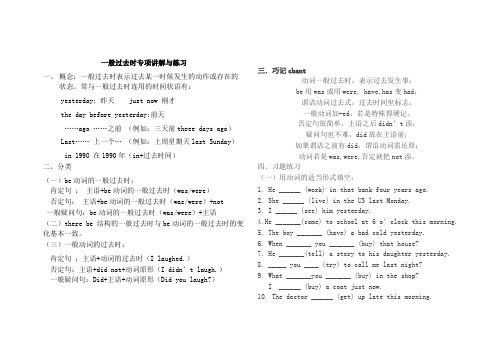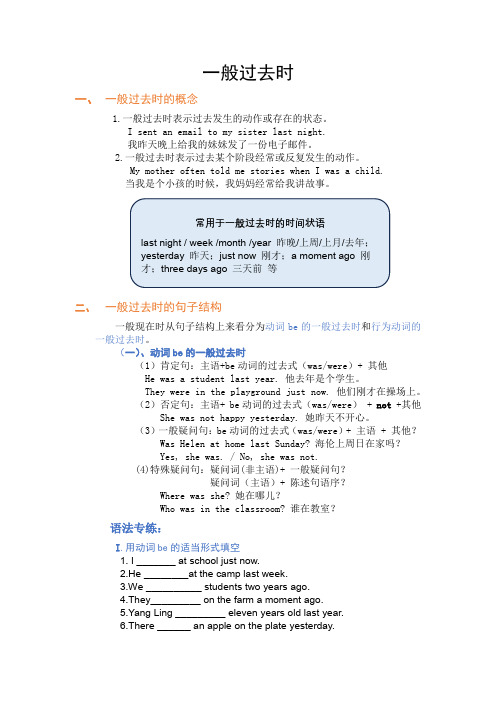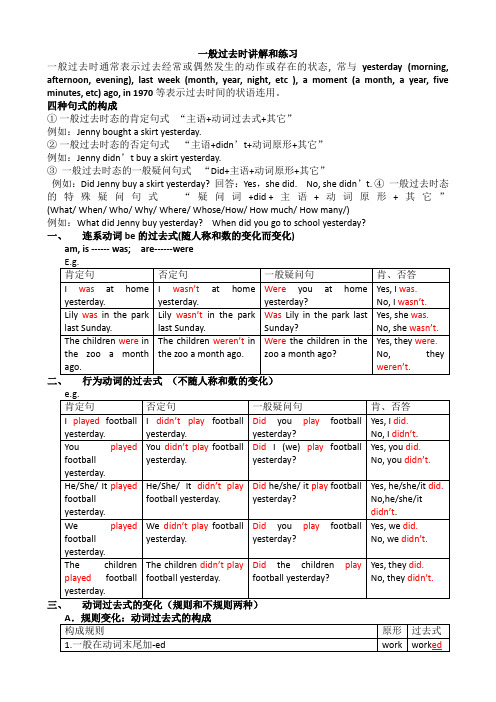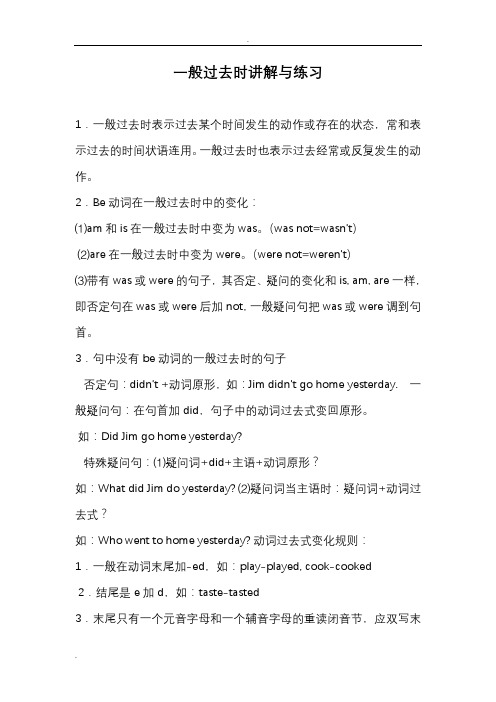(完整版)六年级英语一般过去时讲解与练习
(完整)小学英语一般过去时专项讲解、练习和参考答案

一般过去时专项讲解与练习一、概念:一般过去时表示过去某一时候发生的动作或存在的状态。
常与一般过去时连用的时间状语有:yesterday; 昨天 just now 刚才the day before yesterday;前天……ago ……之前(例如:三天前three days ago)Last…… 上一个… (例如:上周星期天last Sunday)in 1990 在1990年(in+过去时间)二、分类(一)be动词的一般过去时:肯定句:主语+be动词的一般过去时(was/were)否定句:主语+be动词的一般过去时(was/were)+not一般疑问句:be动词的一般过去时(was/were)+主语(二)there be 结构的一般过去时与be动词的一般过去时的变化基本一致。
(三)一般动词的过去时:肯定句:主语+动词的过去时(I laughed.)否定句:主语+did not+动词原形(I didn’t laugh.)一般疑问句:Did+主语+动词原形(Did you laugh?)三.巧记chant动词一般过去时,表示过去发生事;be用was或用were, have,has变had;谓语动词过去式,过去时间坐标志;一般动词加-ed,若是特殊得硬记。
否定句很简单,主语之后didn’t添;疑问句也不难,did放在主语前;如果谓语之前有did,谓语动词需还原;动词若是was,were,否定就把not添。
四、习题练习(一)用动词的适当形式填空:1. He ______ (work) in that bank four years ago.2. She ______ (live) in the US last Monday.3. I ______ (see) him yesterday.4.He _______(come) to school at 6 o’clock this morning.5. The boy _______ (have) a bad cold yesterday.6. When _______ you _______ (buy) that house?7. He _______(tell) a story to his daughter yesterday.8. _____ you ____ (try) to call me last night?9. What _______you _______ (buy) in the shop?I ______ (buy) a coat just now.10. The doctor ______ (get) up late this morning.11. She ________ (paint) the wall last month.12. My mother _______ (be) a worker 20 years ago.13. ________ (be) you here just now?No, I ________ (be not) here.14. Why _______ your brother _______ (cry) last night?15. It ______(be) my mother’s birthday yesterday.(二)翻译下列句子:1.我上周去看爷爷和奶奶了。
小学一般过去时详细讲解与练习

一般过去时详细讲解与练习题一、巧记一般过去时:动词一般过去时,表示过去发生的事;be 用was 或用were,have,has 变had ; 谓语动词过去式,过去时间作标志;一般动词加-ed ,若是特殊得硬记。
否定句很简单,主语之后didn’t 添;疑问句也不难,did 放在主语前;不含be 动词时如果谓语之前有did ,谓语动词需还原;动词若是was,were,否定就把not 添。
含be 动词时疑问句也不难,要把was ,were 放在主语前。
二、be 的一般过去时:学习动词be 的一般过去时,下面有一口诀,它可以帮你们更好地掌 握动词be 的一般过去时。
be 的过去时有四巧: 一是时间状语巧,表示过去的短语要记牢; 二是形式巧,单数was ,复数were ; 三巧是否定句结构,not 紧跟was /were ; 四是疑问句式巧,was /were 向前跑(提前)。
【一巧】时间状语(即标志词)巧。
一般过去时表示过去发生的动作或存在的状态,恰巧 与表示过去的一些时间状语连用。
【二巧】形式巧。
它与一般现在时一样,形式多样:当主语是第一人称单数或第三人称单 数时,谓语动词用was ;主语是第二人称或其他人称复数时,谓语动词用were 。
例如:Iwasintheclassroomyesterdaymorning .昨天早上我在教室里。
HewasatschoollastTuesday .上周二他在学校。
Theywereoverthereamomentago .刚才他们在那边。
【三巧】否定句结构巧。
与动词be 的一般现在时一样,它在动词后面加not 即可变成否定 句,并且was,were 与not 可以缩写成wasn't,weren't 。
即: 主语+wasn't /weren't +表语+其他。
例如:Iwasnot(=wasn't)hereyesterday .昨天我不在这儿。
人教PEP六年级下册英语一般过去式讲解与综合练习

一般过去时(一)基础夯实:一般过去时1.一般过去时表示过去某个时间发生的动作或存在的状态,常和表示过去的时间状语连用。
一般过去时也表示过去经常或反复发生的动作感谢。
2.Be动词在一般过去时中的变化:⑴am 和is在一般过去时中变为was。
(was not=wasn’t)⑵are在一般过去时中变为were。
(were not=weren’t)⑶带有was或were的句子,其否定、疑问的变化和is, am, are一样,即否定句在was或were后加not,一般疑问句把was或were调到句首。
3.句中没有be动词的一般过去时的句子否定句:didn’t +动词原形,如:Jim didn’t go home yesterday.一般疑问句:在句首加did,句子中的动词过去式变回原形。
如:Did Jim go home yesterday?特殊疑问句:⑴疑问词+did+主语+动词原形?如: What did Jim do yesterday?⑵疑问词当主语时:疑问词+动词过去式?如:Who went to home yesterday?基础夯实:动词的过去式请熟记以下不规则动词的过去式:am/is—was are—were do—did go—wentcome—came swim—swam run—ran sing—sangdrink—drank give—gave begin—began win—wonhave—had get—got eat—ate sit--satfeel—felt sleep—slept sweep—swept leave—leftsee—saw draw—drew fly—flew blow—blewknow—knew throw—threw tell—told take—tookmake—made say—said ride—rode write—wroteput— put set—set hurt—hurt read—readbuy—bought teach—taught think—thought catch—caughtfight—fought bring—brought一般过去时的肯定陈述句一般过去时表示过去某个时间发生的动作或存在的状态,常用的时间状语有:yesterday , just now , last +时间, … ago , in 1980等。
一般过去时讲解及练习(讲义)译林版英语六年级上册

一般过去时一、一般过去时的概念1.一般过去时表示过去发生的动作或存在的状态。
I sent an email to my sister last night.我昨天晚上给我的妹妹发了一份电子邮件。
2.一般过去时表示过去某个阶段经常或反复发生的动作。
My mother often told me stories when I was a child.当我是个小孩的时候,我妈妈经常给我讲故事。
二、一般过去时的句子结构一般现在时从句子结构上来看分为动词be的一般过去时和行为动词的一般过去时。
(一)、动词be的一般过去时(1)肯定句:主语+be动词的过去式(was/were)+ 其他He was a student last year. 他去年是个学生。
They were in the playground just now. 他们刚才在操场上。
(2)否定句:主语+ be动词的过去式(was/were) + not +其他 She was not happy yesterday. 她昨天不开心。
(3)一般疑问句:be动词的过去式(was/were)+ 主语 + 其他? Was Helen at home last Sunday? 海伦上周日在家吗?Yes, she was. / No, she was not.(4)特殊疑问句:疑问词(非主语)+ 一般疑问句?疑问词(主语)+ 陈述句语序?Where was she? 她在哪儿?Who was in the classroom? 谁在教室?语法专练:I.用动词be的适当形式填空1. I _______ at school just now.2.He ________at the camp last week.3.We __________ students two years ago.4.They_________ on the farm a moment ago.5.Yang Ling _________ eleven years old last year.6.There ______ an apple on the plate yesterday.7.There ________ some milk in the fridge last Sunday.8.The mobile phone_______ on the sofa yesterday evening.9.Helen and Nancy _______good friends.10.Yesterday______the first of June. All the students ______ excited. II.句型转换1. It was exciting. (改为一般疑问句并作肯定回答)——__________ _________ _______?——_________, _________ __________.2.They were in the playground. (改为否定句)They _________ in the playground.3.All the students were very excited. (改为一般疑问句并作否定回答)——_________ _________ _______ very _______?——_________,_________ _________.4. Jack was 14 years old last year. (对画线部分提问)_________ _________ _______ Jack last year.(二)、行为动词的一般过去时一般过去时中,动词要用过去式,行为动词有规则和不规则变化。
六年级-初一英语一般过去时讲解和练习

一般过去时讲解和练习一般过去时通常表示过去经常或偶然发生的动作或存在的状态, 常与yesterday (morning, afternoon, evening), last week (month, year, night, etc ), a moment (a month, a year, five minutes, etc) ago, in 1970等表示过去时间的状语连用。
四种句式的构成①一般过去时态的肯定句式“主语+动词过去式+其它”例如:Jenny bought a skirt yesterday.②一般过去时态的否定句式“主语+didn’t+动词原形+其它”例如:Jenny didn’t buy a skirt yesterday.③一般过去时态的一般疑问句式“Did+主语+动词原形+其它”例如:Did Jenny buy a skirt yesterday? 回答:Yes,she did. No, she didn’t. ④一般过去时态的特殊疑问句式“疑问词+did +主语+动词原形+其它”(What/ When/ Who/ Why/ Where/ Whose/How/ How much/ How many/)例如:What did Jenny buy yesterday? When did you go to school yesterday?一、连系动词be的过去式(随人称和数的变化而变化)am, is ------ was; are------were累吧!)C.规则动词过去式词尾-ed的读音:1、清辅音后面的-ed读/t/ ( t 除外)如:stopped, hoped, watched, laughed, dressed, pushed, asked, marched, etc.2、浊辅音及元音后面的-ed读/ d /如:lived, tried, moved, rained, played, boiled, cleaned, watered, etc.3、t,d后面加-ed通常读/id/如:needed, wanted, visited, planted, painted, etc.Exercises:I 写出下列动词的过去式A. Regular verbs.1. clean ______2. wash ______3. collect ______4. play ______5. study ______6.try _______7. enjoy _______8. taste _______9. boil ________ 10. stop _______B. Irregular verbs.1. is _______2. am ________3.are _________4. do ________5. go ________6. have _______7. take ______8. blow _______9. bring _______ 10. meet ______11.ride _______ 12.eat _______ 13.swim_______ 14.see ________ e ______II 用所给动词的适当形式填空,注意看清时间状语,判断时态。
六年级英语一般过去时讲解与练习

一般过去时讲解与练习1.一般过去时表示过去某个时间发生的动作或存在的状态,常和表示过去的时间状语连用。
一般过去时也表示过去经常或反复发生的动作。
2.Be动词在一般过去时中的变化:⑴am和is在一般过去时中变为was。
(was not=wasn’t)⑵are在一般过去时中变为were。
(were not=weren’t)⑶带有was或were的句子,其否定、疑问的变化和is,am,are一样,即否定句在was或were后加not,一般疑问句把was或were调到句首。
3.句中没有be动词的一般过去时的句子否定句:didn’t+动词原形,如:Jim didn’t go home yesterday.一般疑问句:在句首加did,句子中的动词过去式变回原形。
如:Did Jim go home yesterday?特殊疑问句:⑴疑问词+did+主语+动词原形?如:What did Jim do yesterday?⑵疑问词当主语时:疑问词+动词过去式?如:Who went to home yesterday?动词过去式变化规则:1.一般在动词末尾加-ed,如:play-played,cook-cooked2.结尾是e加d,如:taste-tasted3.末尾只有一个元音字母和一个辅音字母的重读闭音节,应双写末尾的辅音字母,再加-ed,如:stop-stopped4.以“辅音字母+y”结尾的,变y为i,再加-ed,如:study-studied5.小学常用不规则动词过去式:am,is-was,are-were,do-did,see-saw,say-said,give-gave,get -got,go-went,come-came,have-had,eat-ate,take-took,run-ra n,sing-sang,put-put,make-made,read-read,write-wrote,draw -drew,drink-drank,fly-flew,ride-rode,speak-spoke,sweep-s wept,swim-swam,sit-sat一.用be动词的适当形式填空1.We__________students five years ago.2.Patti and I__________good friends.3.Today__________Tuesday,Yesterday__________Monday.4.Sue__________on the slide a moment ago.5.Where is my hat?It_______on the desk just now.二.单项选择:从下列各题后所给的四个选项中选择最佳答案填空。
(完整版)一般过去时讲解及练习
一般过去时1)在确定的过去时间里所发生的动作或存在的状态。
时间状语有:yesterday, an hour ago, the other day, ,yesterday morning (afternoon, evening), last night (week, month, year…), a moment ago , a week ago, three years ago… just now,in the past等。
Where did you go just now?2)谓语动词形式为动词的过去式,一般在动词原形后加-ed,I was tired last night,昨天晚上我很累。
We visited the museum yesterday.昨天我们参观了那个博物馆。
二、一般过去时的构成1.was/were+形容词/名词/...如I was at home yesterday.昨天我在家。
Mr.Green was not a teacher last year.去年格林女士不是一个老师。
系动词be的过去式为am,is→was are→were第一人称单数(I)/第三人称单数(he/she/it)+was第二人称单数(you)/各人称复数(we/you/they)+were.2.实义动词的过去式+其他成分My mother went shopping yesterday.我妈妈昨天去购物了。
His uncle worked in Beijing in 2014.他叔叔2014年在北京工作。
三、一般过去时的句式四、动词过去式的变化规则3 used toused to + do:"过去常常"表示过去习惯性的动作或状态,但如今已不存在。
Mother used to take a walk. (过去常常散步)二、构成及变化1. Be动词在一般过去时中的变化:am 和is在一般过去时中变为was。
(完整word版)六年级英语一般过去时讲解与练习
一般过去时讲解与练习1.一般过去时表示过去某个时间发生的动作或存在的状态,常和表示过去的时间状语连用。
一般过去时也表示过去经常或反复发生的动作。
2.Be动词在一般过去时中的变化:⑴am 和is在一般过去时中变为was。
(was not=wasn’t)⑵are在一般过去时中变为were。
(were not=weren’t)⑶带有was或were的句子,其否定、疑问的变化和is, am, are一样,即否定句在was或were后加not,一般疑问句把was或were调到句首。
3.句中没有be动词的一般过去时的句子否定句:didn’t +动词原形,如:Jim didn’t go home yesterday. 一般疑问句:在句首加did,句子中的动词过去式变回原形。
如:Did Jim go home yesterday?特殊疑问句:⑴疑问词+did+主语+动词原形?如:What did Jim do yesterday? ⑵疑问词当主语时:疑问词+动词过去式?如:Who went to home yesterday? 动词过去式变化规则:1.一般在动词末尾加-ed,如:play-played, cook-cooked2.结尾是e加d,如:taste-tasted3.末尾只有一个元音字母和一个辅音字母的重读闭音节,应双写末尾的辅音字母,再加-ed,如:stop-stopped4.以“辅音字母+y”结尾的,变y为i,再加-ed,如:study-studied 5.小学常用不规则动词过去式:am,is-was, are-were, do-did, see-saw, say-said, give-gave, get-got, go-we nt, come-came, have-had, eat-ate, take-took, run-ran, sing-sang, put-put, make-made, read-read, write-wrote, draw-drew, drink-drank, fly-flew, rid e-rode, speak-spoke, sweep-swept, swim-swam, sit-sat一.用be动词的适当形式填空1. We __________ students five years ago.2. Patti and I __________ good friends.3. Today __________ Tuesday, Yesterday __________ Monday.4. Sue __________ on the slide a moment ago.5. Where is my hat? It _______ on the desk just now.二.单项选择:从下列各题后所给的四个选项中选择最佳答案填空。
(完整版)六年级英语一般过去时练习题及答案讲解
一般过去时练习题及答案讲解一:用所给动词的适当形式填空1.Tom and Mary ___________ (come) to China last month.2.Mike _________________(not go) to bed until 12 o’clock last night. SoI _______ (get ) up late.3.Mary __________ (read) English yesterday morning.4.There _________ (be) no one here a moment ago.5.I ___________ (call) Mike this morning.6.I listened but ___________ (hear) nothing.7.Tom ___________ (begin) to learn Chinese last year.st week we _________ (pick) many apples on the farm.9.My mother ________________ (not do) housework yesterday.10.She watches TV every evening. But she _______________ (not watch) TV last night.11.________ your father ________ ( go ) to work every day last year?12. —What time _______ you _______ (get) to Beijing yesterday?—We __________ (get) to Beijing at 9:00 in the evening.13.What __________ (make) him cry (哭) just now?st year the teacher ___________ (tell) us that the earth moves around the sun.15.There ____________ a telephone call for you just now. (be)16.There __________ not enough people to pick apples that day. ( be)17.There _____________ any hospitals (医院) in my hometown (家乡) in 1940. ( be not)18.There ____________ enough milk at home last week, wasn’t there?19.Eli ____________ to Japan last week. ( move)20. –When _______ you _________ (come) to China? - Last year.21.Did she ________ (have) supper at home?22.Jack ____________ (not clean) the room just now.23._________ (be) it cold in your city yesterday?24.How many people ________ (be) there in your class last term?25.It ________ (be) hot yesterday and most children _______ (be) outside.26. There ________ (be) a football match on TV yesterday evening, but I _________ (have) no time to watch it.27. He ate some bread and _________ (drink) some milk.28. ________ he __________ (finish) his homework last night?29. I__________(be) tired yesterday.30. I ___________(gain ) Arts degree last year.31. What _________ you ___________ (do) last night?32. My grandfather _________ (leave) Hong Kong for New York in 1998.33. What _______ he ________ (do) yesterday?34. Last week I _______ (buy) a new bike.35. He ________ (be) here just now.36. He __________ (not find ) his key last night.37. My father __________ (drink) a lot of wine yesterday.38. ________ you ________ (finish) your homework yesterday?39. I ________ (eat) some eggs and bread this morning.40. Her mother __________ (not give) the girl any present.二、改错题1.How is Jane yesterday? _____________________2.He go to school by bus last week. ____________________________ 3.He often goes home at 6:00 last month. ____________________________4.I can fly kites seven years ago. ______________________________ 5.Did you saw him just now. ____________________________________6.Tom wasn’t watch TV last night. ____________________________________7.I didn’t my homework yesterday. ____________________________________8.He wait for you three hours ago. ____________________________________9.Who find it just now ? ________________________________________三、按要求变换句型。
小学英语一般过去时讲解及练习
六年级英语复习(第九课时)一般过去时概念:表示在过去某个时间里所发生的动作或存在的状态。
常见过去时态时间状语:Yesterday_________ yesterday morning/ evening________last night/week/ month/year__________________________ the day before yesterday________just now_____________ two days ago_______a week ago__________in 1990______:例:I went to bed at eleven last night. 昨晚我11:00睡觉。
行为动词一般过去时变化规则1.一般在动词原形末尾加-ed,如:look-looked, play- played2.结尾是e加d,如:live-lived,use-used,hope-hoped3.末尾只有一个元音字母和一个辅音字母的重读闭音节,应双写末尾的辅音字母,再加-ed,如:stop-stopped,plan-planned4.以“辅音字母+y”结尾的,变y为i,再加-ed,如:study-studied5.常见不规则动词一般过去时:am/is→was are→were have/has→had do→didsing→sang sit→sat give→gave run→rancome→came eat→ate take→took write→wrote{ride→ rode drive→drove speak→spoke get→gotgo→went make→made know→knew see→sawteach→taught buy→bought read→read put→puthurt→hurt cut→cut fall→fell say→said句式变化(1) Be动词在一般过去时中的变化①am/is→_________________ 否定形式wasn’t(= was not)②are→__________________ 否定形式weren’t(= were not)③否定句在was或were后加_______,一般疑问句把was或were调到_____。
- 1、下载文档前请自行甄别文档内容的完整性,平台不提供额外的编辑、内容补充、找答案等附加服务。
- 2、"仅部分预览"的文档,不可在线预览部分如存在完整性等问题,可反馈申请退款(可完整预览的文档不适用该条件!)。
- 3、如文档侵犯您的权益,请联系客服反馈,我们会尽快为您处理(人工客服工作时间:9:00-18:30)。
一般过去时讲解与练习1.一般过去时表示过去某个时间发生的动作或存在的状态,常和表示过去的时间状语连用。
一般过去时也表示过去经常或反复发生的动作。
2.Be动词在一般过去时中的变化:⑴am和is在一般过去时中变为was。
(was not=wasn’t)⑵are在一般过去时中变为were。
(were not=weren’t)⑶带有was或were的句子,其否定、疑问的变化和is,am,are一样,即否定句在was或were后加not,一般疑问句把was或were调到句首。
3.句中没有be动词的一般过去时的句子否定句:didn’t+动词原形,如:Jim didn’t go home yesterday.一般疑问句:在句首加did,句子中的动词过去式变回原形。
如:Did Jim go home yesterday?特殊疑问句:⑴疑问词+did+主语+动词原形?如:What did Jim do yesterday?⑵疑问词当主语时:疑问词+动词过去式?如:Who went to home yesterday?动词过去式变化规则:1.一般在动词末尾加-ed,如:play-played,cook-cooked2.结尾是e加d,如:taste-tasted3.末尾只有一个元音字母和一个辅音字母的重读闭音节,应双写末尾的辅音字母,再加-ed,如:stop-stopped4.以“辅音字母+y”结尾的,变y为i,再加-ed,如:study-studied5.小学常用不规则动词过去式:am,is-was,are-were,do-did,see-saw,say-said,give-gave,get-got, go-went,come-came,have-had,eat-ate,take-took,run-ran,sing-s ang,put-put,make-made,read-read,write-wrote,draw-drew,drink -drank,fly-flew,ride-rode,speak-spoke,sweep-swept,swim-swam, sit-sat一.用be动词的适当形式填空1.We__________students five years ago.2.Patti and I__________good friends.3.Today__________Tuesday,Yesterday__________Monday.4.Sue__________on the slide a moment ago.5.Where is my hat?It_______on the desk just now.二.单项选择:从下列各题后所给的四个选项中选择最佳答案填空。
()1.My father______ill yesterday.A.isn't B.aren't C.wasn't D.weren't()2.______your parents at home last week?A.Is B.Was C.Are D.Were()3.The twins______in Dalian last year.They______here now.A.are;were B.were;are C.was;are D.were;was()4.______your father at work the day_____yesterday(前天)?A.Was;before B.Is;before C.Was;after D.Is;after()5.—Who was on duty last Friday?—______.A.I am B.I was C.Yes,I was D.No,I wasn't四.写出下列动词的过去式is\am_________fly_______plant________are________drink_________play _______go________make________dance________worry________ask_____taste_________eat__________dra w________put______throw________kick_________pass_______do______ __五、请用正确动词形式填空。
1.I_________(have)an exciting party last weekend.2.---_________she_________(practice)her guitar yesterday?---No, she_________.3.---What________Tom________(do)on Saturday evening?---He__ ______(watch)TV and__________(read)an interesting book.4.They all_________(go)to the mountains yesterday morning.5.She_________(not visit)her aunt last weekend.She________(stay)at home and_________(do)some cleaning.六.句型转换1.It was exciting.否定句:_____________________________________________一般疑问句:___________________________________________肯、否定回答:__________________________________________2.All the students were very excited.否定句:_____________________________________________一般疑问句:__________________________________________肯、否定回答:__________________________________________3.They were in his pocket.否定句:_____________________________________________一般疑问句:___________________________________________肯、否定回答:__________________________________________4.Su Hai took some photos at the Sports day.否定句:_____________________________________________一般疑问句:___________________________________________肯、否定回答:__________________________________________5.Nancy went to school early.否定句:_____________________________________________一般疑问句:___________________________________________肯、否定回答:__________________________________________6.We sang some English songs.否定句:_____________________________________________一般疑问句:___________________________________________肯、否定回答:__________________________________________七、翻译下列句子1.我过了一个忙碌但却刺激的周末。
I______________________________________exciting weekend.2.Jenny喜欢看书。
昨晚她看了一本英语书。
Jenny likes___________________.She_________an Englishbook last night.3.Emma每天都看电视。
可是昨天他没有看。
Emma__________TV every day.But he_________________________yeste rday.4.上周六他们做什么了?他们做作业和购物了。
What________they__________________Saturday?They_________ _________homework and______________.5.今天早上方方得做饭,因为他父亲不在家。
This morning Fangfang________________because his father________ ______yesterday.八.改写句子:1、Lucy did her homework at home.(改否定句)Lucy_______________her homework at home.2、He found some meat in the fridge(冰箱).(变一般疑问句)___________he_____________________meat in the fridge?3、There was some orange in the cup.(变一般疑问句)_______there_______orange in the cup?4.Frank read an interesting book about history.(一般疑问句)_______Frank_______an interesting book about history?5.Why not go out for a walk?(同义句)_______________________out for a walk?九.改错题1.How is Jane yesterday?_____________________2.He go to school by bus last week.________________________3.He often goes home at6:00last month.___________________4.I can fly kites seven years ago.__________________________5.Did you saw him just now._____________________________十.句型转换和连词成句.1.She was angry yesterday.(改为一般疑问句)___________________________________________________.2.They were in the park just now.(对划线部分提问)___________________________________________________?3.There were some plates on the table.(改为否定句)__________________________________________.4.The little dog was1years old last year.(对划线部分提问)____________________________________________________.5.Were Lily and Patti at school this morning?(作肯定,否定回6.My friend Tom/Canada/year/in/last/was(连词成句)_____________________________________________.7.were/some/cars/the/just now/ground/there/on/the(连词成句)_____________________________________________.8.How are you going to school?_________________________________________.(坐公共汽车)1.How is Jane yesterday?_____________________2.He go to school by bus last week.________________________3.He often goes home at6:00last month.___________________4.I can fly kites seven years ago.__________________________5.Did you saw him just now._____________________________十.句型转换和连词成句.1.She was angry yesterday.(改为一般疑问句)___________________________________________________.2.They were in the park just now.(对划线部分提问)___________________________________________________?3.There were some plates on the table.(改为否定句)__________________________________________.4.The little dog was1years old last year.(对划线部分提问)____________________________________________________.5.Were Lily and Patti at school this morning?(作肯定,否定回6.My friend Tom/Canada/year/in/last/was(连词成句)_____________________________________________.7.were/some/cars/the/just now/ground/there/on/the(连词成句)_____________________________________________.8.How are you goi ng to school?_________________________________________.(坐公共汽车)。
